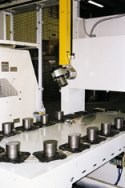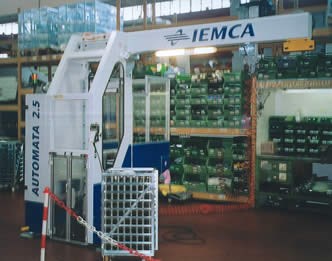Gantry Takes Hands Out Of Part Handling
Automating material delivery and removal from the machining process is one key method of taking some of the production cost from manufacturing. Iemca, known for automating machine tools with its line of bar feeders, has introduced a new gantry system for chucked parts.
Throughout metalworking, shops are looking for ways to reduce manufacturing costs through productivity and efficiency gains on the shop floor. Automating material delivery and removal from the machining process is one key method of taking some of the production cost from manufacturing.
Iemca, known for automating machine tools with its line of bar feeders, has introduced a new gantry system for chucked parts. The U.S. debut of Automata 2.5 at the Eastec 2006 show in Springfield, Massachusetts, attracted good traffic and strong interest, according to company representatives working the booth.
Typically, gantry load/unload devices are integral to the machine tool they are designed to automate. The Automata is a generic loader designed to automate parts loading for lathes, grinders and machining centers.
It uses a cantilever design with a free-standing gantry arm that carries the load/unload manipulator. It has an X-axis stroke of 2,500 mm and a Y-axis stroke of 1,200 mm creating a working zone that encompasses most machine tools. Part capacity is 2.5 kg for the workpiece blank. Typical load/unload cycle time is 7 seconds, which varies based on application.
An advantage of the cantilever design, the company says, is that the entire gantry unit is free standing and not mechanically connected to the machine tool it services. Therefore, no operational vibration is transferred from the gantry’s motion to the machine when the machine is in cycle.
Installed on the headstock end of a turning center, the Automata loader travels above the top of the machine tool, allowing full access to the front of the machine. A special door, designed for the machine tool being automated, is installed on the machine to allow access for the gantry arm and part manipulator.
In operation, the gantry takes part blanks from either a pallet or stacker within the gantry’s superstructure. Depending on the part, nine or more trays can be loaded off-line onto a wheeled cart. Two of these carts come standard with the gantry so one can be prepared while the other is feeding the machine tool. For a 20-mm-diameter blank, capacity is 792 parts for each cart.
Blanks are picked from the processed tray and loaded into the machine tool for machining. The loader has two grippers that remove the finished part and load the new blank in a single trip inside the machine. The gantry can also service a subspindle if the machine has one.
Completed parts are returned to the tray, and when a tray is fully processed, the next tray of blanks is automatically positioned under the gantry. This process goes on until all blanks on the trays are machined. Once a full trolley of parts is processed, it is removed, and the next trolley can be rolled into position.
This automated system creates the opportunity for post-process gaging or other automated inspection/checking devices to be installed. For example, the gantry could be programmed to pass a finished part through a laser gage and use that data for dimensional verification and closed-loop feedback to the machine’s CNC for automatic tool compensation.
Programming the Automata is via a simple hand-held control that teaches the loader through a single walk-through. Programs can be captured and reused on subsequent part orders to expedite change-over. Gantry cycles are initiated by M-code from the machine tool CNC, so the loader and machine remain in sync during operation.
Automating material handling on lathes or other machine tools frees operators to supervise a larger number of machines, lowering the direct cost of labor and helping shops become more competitive. The Iemca Automata is a cost-effective way to automate existing or new equipment.
Related Content
Reinventing the Wheel with Robot-Automated CNC Multitasking
One race team discovers how to efficiently manufacture a new wheel nut design for the next-generation NASCAR stock car with the help of a CNC mill/turn and a built-in robot.
Read MorePursuit of Parts Collector Spearheads New Enterprise
While searching for a small parts accumulator for Swiss-type lathes, this machine shop CEO not only found what he was looking for but also discovered how to become a distributor for the unique product.
Read MoreTips for Troubleshooting and Repairing Chip Conveyors
A nonfunctioning chip conveyor can cause a high-production machine to be down for an extended period of time. Here is some troubleshooting advice if you’re having issues with your chip conveyors.
Read MoreAutomation Breakthroughs Revolutionize Precision Machining for Complex Parts
Marubeni Citizen-Cincom delivers custom solutions to address some of the biggest challenges in precision machining from handling small parts, to robot integration and unique tooling needs.
Read MoreRead Next
Emerging Leaders Nominations Now Open
Here’s your chance to highlight a young person in your manufacturing business who is on the path to be a future leader moving your company forward.
Read MoreA Tooling Workshop Worth a Visit
Marubeni Citizen-Cincom’s tooling and accessory workshop offers a chance to learn more about ancillary devices that can boost machining efficiency and capability.
Read More5 Aspects of PMTS I Appreciate
The three-day edition of the 2025 Precision Machining Technology Show kicks off at the start of April. I’ll be there, and here are some reasons why.
Read More

















.png;maxWidth=300;quality=90)







